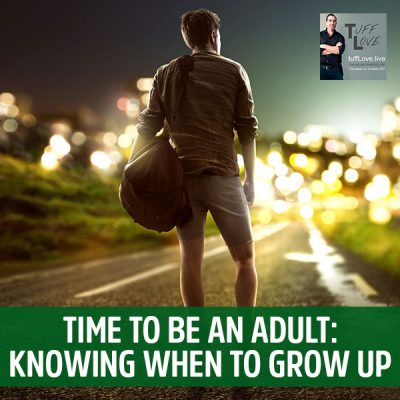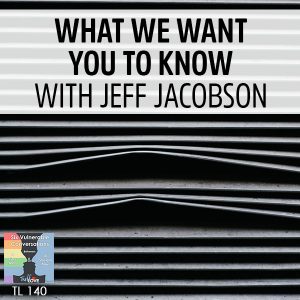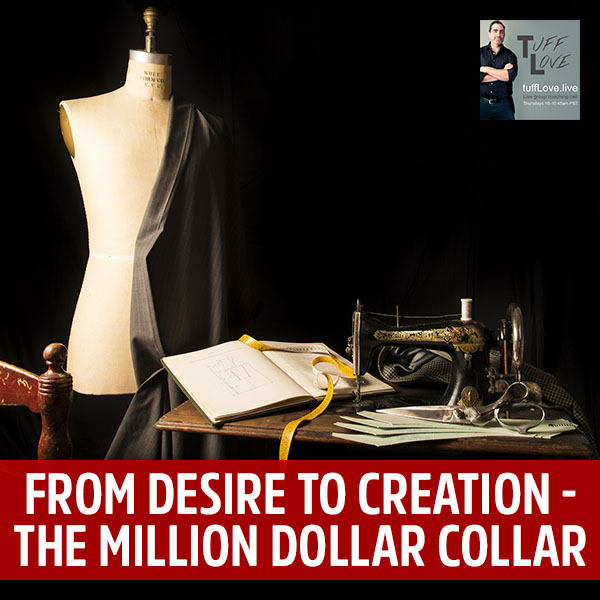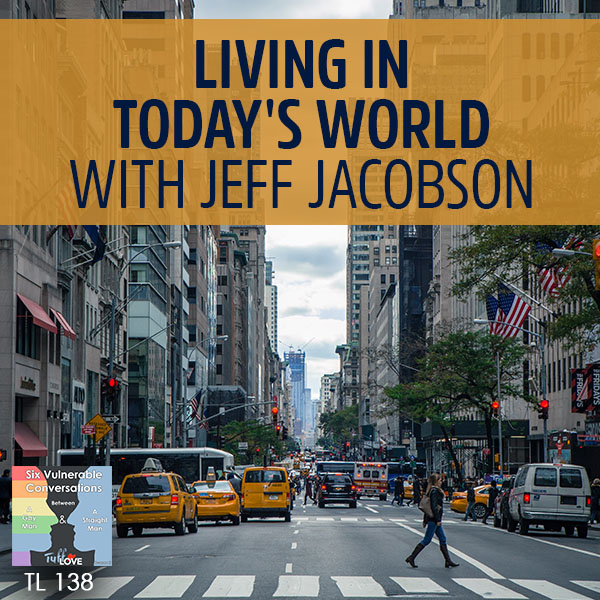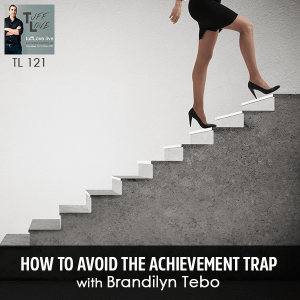
121: The Achievement Trap: We Don’t Have To Do What We Think We Ought To with Brandilyn Tebo
Mar 20, 2018
Too often we find ourselves in the achievement trap, which is following what we think we’re supposed to achieve. We’ve been programmed to go after certain dreams and live in certain ways to truly be successful. We’re always trying to please, and look perfect and be perfect for everybody else. In the book, The Achievement Trap, Brandilyn Tebo talks about how to undo those beliefs and live your true, authentic commitments rather than in accordance to what is pleasing and satisfying to others.
—
I’m very happy to be presenting another show called “I’ll Do It My Way.” This show was created by me watching another very successful book author and podcaster, watching his process and thinking I can’t do it that way, and then go to therapy and talking about that and finding out about childhood wounds. I bring my friend Brandilyn Tebo back on the show. She was in Show 092 called The Achievement Trap. We bring her back on because her book is coming out in a week. I want to have her express how she does things her way, how she coaches people to not fall into what she calls the achievement trap to live a happier and fuller life. It’s a super fun, collaborative, high energy podcast and I hope you like it. For more shows, please visit TuffLove.Live.
I’m very happy to have my good friend, Brandilyn Tebo, coming on to rap with me around the concept of doing it my way, or specifically I’ll Do it My Way, which was an interesting topic for me to come up with. I’ll explain what the origins and why we’re doing this and what’s going on in the show. I’m very happy always to participate in sharing knowledge and concepts and hopefully impacting you. If you liked the show and want to be a guest on it, please email Summer@KandellConsulting.com. If you liked the show and you get turned on by it, please visit iTunes or Stitcher or your favorite podcast app and give us a little loving.
This is called I’ll Do it My Way, which is a very interesting origin of how this happened. It happened with my archnemesis, Lewis Howes. He’s not really my archnemesis because he doesn’t even know who I am. It’s not like we’re competing, but Lewis Howes is a guy I’ve talked about a couple times. I’ve been watching him. He is a great guy. He’s got a good heart. He wrote a book called The Mask of Masculinity that I didn’t like very much. He is also very popular podcaster. He does something called The School of Greatness. Recently, he’s leveraging his success by running a course. This course is a way to achieve success the way he did it. He’s sharing his knowledge in terms of what he did so other people can have their success. I don’t know how good the course is or not. I’m not going to take it. This conversation is happening because I followed him. I signed up for the webinar And I went through the whole email sequence.
My heart sank because he’s doing it the way that I’ve seen done a thousand times before. There’s a part of me that’s just antagonistic to it, aggressive. There’s angst inside of me when I watch this guy who I respect a lot doing it the same exact way. It’s the same Facebook Ad. It’s the same webinar, the same format. It’s the same email sequence that comes afterwards. There’s part of me that’s like, “No, Lewis. Why are you doing this exactly the way that everyone else does it?” He’s doing it the way everyone’s doing it because it works. It’s proven methodology in terms of how things work and don’t work. There’s a part of me, the rebellious part of me that just can’t do it the way that other people are doing it. That is a wonderful, noble thought or gesture, but it does leave me with the question, “How am I going to sell this book? How am I going to market this book?” I’m self-publishing on purpose and it’s on me, my team, my skills and my ingenuity, and I am saying no to all these proven methods that have worked in the past before.
I went to therapy on the topic of the show and we discovered the reason that I have to do it my way is because of my childhood. There’s something happening in real time because of my childhood, who would have thought? It had to do with my dad. I talk about my dad a lot on the show. Sometimes he listens. My mom is an avid listener to the show. You never know what my dad’s going to say. My dad, in the most value neutral way, just love me to death and had a very pedantic set way of how he wanted me to be. There was a vision in his mind, a New York first-born Jew, of who I was supposed to be, how I’m supposed to live, how I’m supposed to act, and what I was supposed to bring to the table. I rebelled against it from the time I was thirteen or fourteen when I started to listen to that music that told me to be a rebel. I got off The Beatles, Depeche Mode, The Cure, and all these rebellious things. I found my different voice inside of it.
Since I was thirteen or fourteen, I’ve been going against the status quo. I was the Captain of the football team that didn’t like hanging out with the football players. I was the Captain of the football team that teased the cheerleaders and hung out with the misfit toys. I was the guy who liked hanging out against the grain. Even though I slipped into this stream of corporate America for the next ten years of my life, from 18 to 28, there was this rebellious side. Through therapy, I’ve discovered that to do things my way is paramount. My freedom, my independence, my own self, who I am, always being in that vein of integrity inside myself, is paramount to my survival. Some people need to survive by food or need to survive by being in relationship, survive by avoiding certain people. To me, the part of my soul survival has to do with me not following the grain. From 28 until 44, I spent years following other people and suffering and dying on the inside.
What I’ve discovered is this important thing for me to do it the way I want to do it. If I don’t do that, it’s not worth it. A lot of us sell our souls for success. Brandilyn’s going to come and talk about her book, The Achievement Trap, which is all around this vein or this way of following what we think we’re supposed to achieve. I feel very successful in my life. I’ve got a great relationship. My health is outstanding. My business is off the chart. For the first time in my life, for the last three years, I’ve been doing it 100% my way, not my dad’s, not my mom’s, not some woman that I bottom to become her second. The last year has been about me finding how to do it my way. It’s so exciting to find my success and to feel so good about myself at the same time. You might be in the rut, the record player grooves of your habits, your habitual things, and you might be suffering deep inside of it.
I can thank my good friend, Lewis Howes, for reminding me that I don’t have to follow his path. I can look at the best of what he offers, his integrity and the kindness I perceive in him, and then leave the rest on the table. I don’t need to do it in any way. Even if I only sell 100, 200, or 500 books, I’ll know that I did it my way with integrity. Anything else is a self-sacrificial death and I can’t live like that anymore. We’ll see what comes next. Let’s bring our guest on to wax the poetic on her views of doing it her way.
121: The Achievement Trap: We Don’t Have To Do What We Think We Ought To with Brandilyn Tebo
The book is called The Achievement Trap. It’s the people pleaser, perfectionist, and overachiever’s guide to freedom and true success. It is a step-by-step guide for undoing the beliefs that we have to live our life in accordance to what other people want and in accordance to what is going to be pleasing and satisfying to others, especially the authority figures who we hold in high regard, and how to get back to the source, the origin, of that sense of unworthiness and heal that so that you’re able to live your life from a heart-based place and from what your true, authentic commitments are rather than from trying to please the externalities and look perfect and be perfect for everybody else.
I use the analogy in the book that when we feel unworthy and we try to accomplish things in order to not feel unworthy is like drinking salt water to quench your thirst. The more we try to accomplish, the more we’re stuck in the mindset that our accomplishments are the thing that makes us worthy and then the less worthy deep down we feel. It’s maybe effective in the short-term. It’s very ineffective in the long-term to try to accomplish or satisfy a sense of unworthiness. That’s what the book is about.

The Achievement Trap: The more we try to accomplish, the more we’re stuck in the mindset that our accomplishments are the thing that makes us worthy.
Can you give people a two-sentence history of how you discovered this part of yourself to write the book? Give me the mini version of how you got to this point.
When I was seven years old, I was sexually assaulted. At that point, I decided that I wasn’t good enough and lived my life for the next ten to fifteen years from a place of trying to compensate for feeling unworthy and not good enough. That led to anorexia and being a severe type A personality that needed to get everything perfect in her life. I felt that inside and my own healing of all of that, healing my eating disorder, undoing that process, and healing my shame from my childhood led me to a place of being able to connect to my heart and my passion.
How did you write your book? You have an interesting publisher. Give our audience a feel of how you wrote your book. What was your process?
I wasn’t intending to write a book. I always believed that when I was going to write a book, it was going to be a six-volume manual that was going to take decades for me to write. Then I would have to share everything about the complexities of my life, and that seemed way too hard to tackle. I’m a columnist for Elephant Journal and I wrote this one article that I titled The Achievement Trap that was the synopsis of what the book became later. I got so many people reaching out to me and re-sharing it, wanting to talk about it, and wanting to dive deeper. I found that a lot of my coaching calls were centered around this very thing and helping people connect to their hearts and heal the achievement trap.
I get off coaching calls and I’d write an article based on what we just created on that call and I publish that. It just grew and grew until I realized that this set of like fifteen articles all strung together and formed this thesis of the achievement trap. I took that and then I went in and added my own personal stories and anecdotes and just grew what that was. Eventually, it was a book. It worked itself through me. It wasn’t ever a decision of like, “I’m going to write a book now.”
Some people are born to greatness. Some have it thrust upon them. Talk about your publisher.
It’s Ben C. Allen Publishing. When I realized I had a book in my hands, I posted on my own Facebook saying, “Does anybody know any great publishers?”Somebody commented and was like, “You absolutely need to connect to Ben,” and connected the two of us. I got on the phone with Ben. We had a two-hour conversation. He got it at a level of depth that people don’t normally get it so quickly and was so passionate and inspired by it. We riff off each other with all of these ideas for the difference that this book could make and how we could get it out there. He offered to work with me and make it so that this book reached the audience that we want it to reach. Since then, we’ve been in communication every week talking about how to get this message out there in a big way.
When was it published?
2018 is the publishing date.
What’s your plan and what’s your methodology for marketing?
Grass roots. I am connecting to everybody that’s already in my network and sharing about it. We’re going to be going on college campuses. I’m going to be doing workshops around it. I have my own podcast, The Achievement Trap, which is interviewing heart-based entrepreneurs that have escaped the achievement trap and are living from their soul rather than from their mind’s idea of what their life should look like. That has been a wonderful way to demonstrate what it looks like to free oneself from the achievement trap and what a life that looks like. I have about fifteen of those interviews that as soon as the book is live, we’re going to be releasing weekly.
You had the sexual assault. You had fifteen years of trying to get into the worthiness in terms of the self-worth. How old are you now?
I’m going to be 25 in July.
The last three years, what did you have changed? Give some specific things that you changed in order to up-level yourself to find your own connection.
It’s always interesting for me to share the elevator pitch of that story because it’s so much more complicated than that. I took one thing that happened to me and I reduced all of it down to that when that’s not how it was at all. It was like this very complex childhood of so much happening that left me in this place, but it’s just easier to dilute it to that version of the story. What happened was I realized that I don’t have to believe my thoughts. That was the original epiphany. It’s just domino effect to everything that came after that, the realization that all the thoughts running through my head are past-based decisions that I made in a moment of feeling uncomfortable and unsure how to protect myself. Every decision that I’ve made about “I’m not good enough in this way” or “people can’t find out this part about me, about my history,” none of that was real. That was all just an invention of my mind that was trying to protect me from having those vulnerable experiences again.
[Tweet “When I learned to start questioning my thoughts and looking at my thoughts rather than looking through them, that was the seed.”]
When I learned to start questioning my thoughts and looking at my thoughts rather than looking through them, that was the seed. That was a game changer. I looked around my life and I realized how dominated the human population is by our thoughts and by our internal state and how we live a life in reaction to our thoughts and feelings rather than creating the world that we want to be and being the change that we want to be in the world. I started wanting to develop myself in all the ways I would need to develop myself to help other people make that shift from reactive mode to creative mode. There began my journey of inner work that is just so much. I went through a few years of landmark training programs.
I studied somatic healing, non-violent communication, neurolinguistic programming, acceptance and commitment therapy, The Work of Byron Katie, and did ten-day silent meditation retreat and started studying Eastern philosophies. I went down the rabbit hole of every rabbit hole that there was for me to go down and started practicing it. Because of my commitment to making a difference for people, whenever I found myself ineffective in being able to make that difference, I would figure out what I needed to do to develop myself to be more effective. That’s been my life for the past several years.
When I was 25, it was the ’90s, personal development was on the outskirts. It’s wonderful that you dove into all these different arenas to take the steps to discover yourself. There are a lot of lost people out there, especially of your generation who don’t know the next steps to find their way in this world, to find who they are. In your coaching, what are some pragmatic steps you recommend to people to move out of the achievement trap? Is there any specific formula? How does it go?
We reverse engineer it and we start by looking at where you feel like you have to be something or you have to do something in order to feel okay about yourself. You know where that is because you feel stress. When you feel stressed around, “I have to produce this result, I have to make sure that people think this about me,” then that’s your access to figuring out what the seed of unworthiness is there. If you’re somebody that feels like you have to maintain a certain weight and if you go over that weight, then people are going to think you’re gross and they’re going to find out that you’re secretly not good enough. You can start from that place and we can trace back through a series of exercises where that unworthiness was birthed from, and it’s something from your past. It’s not actually happening in that moment. It’s something from your past.
Once we figure out where that comes from, then we realize, “I’m reacting to something that’s not happening now. I’m probably reacting to something that happened when I was seven years old or fifteen years old or twenty years old.” At that time, when that bad thing happened to me, I made a decision about how I would protect myself. I work with a lot of people that have a parent walk out on them. This didn’t happen to me, but a parent walks out on them and then they decide, “That must be because I’m not good enough. Therefore, I’m going to be so smart that nobody’s ever going to be able to not love me again.” I make this decision about what we have to be to compensate for feeling unworthy, and then we live our life from that decision, and that decision disappears from our view.
We don’t remember that we made that decision because it becomes the lens through which we look at life. I call them protective decisions. It’s like our ego trying to save us from ever having to experience abandonment or rejection again. It does come from a heart-based place, but it makes it so that we end up working against ourselves. You work back and you figure out when this protective decision happened. It’s a lot of inner child work, healing that and also challenging those belief systems that got created in those moments, realizing where it comes from, having awareness of where this process got formulated. It’s just undoing all those little knots so that you no longer are ruled by it. When those feelings of unworthiness come up, you can look at them and have a step-by-step process of how to free yourself from being dominated by them.
It all comes back to the childhood wounds. When you’re talking about that reverse decision, that’s what happened in therapy when I found out the reason I need to do things my way was just the control that I felt imposed on me by my parents and my dad and a path laid out on me. So many people are stuck in this “I should be doing it this way,” or “I’ll lose my parents’ love,” or “My partner will abandon me.” If you reverse engineer and you find this thing about them, there’s still that fear. There’s a fear of abandonment that’s in all of us. What’s one thing you talk to people about? How do you let people unlock that fear of abandonment?
The reason we’re afraid of abandonment is because we believe that we don’t have the capacity to handle it. We build up the story in our head of, “If I don’t make enough money, or if I’m not fit enough, or if I’m not beautiful enough, or successful enough,” we have this whole enormous fear-based story around what then it could be. Most people are not even aware of what that story is. They just live in reaction to that story. It’s not in their awareness. It’s something that’s affecting the way that they live their lives. The first step is realizing how absurd most of our fear-based stories are, about what would happen if we didn’t succeed. Oftentimes, there’s something like, “If I don’t achieve X, Y, and Z, then everybody in my life is going to stop loving me. They’re going to find out that I’m secretly this horrible person. I’m going to be alone. I’m going to go broke. I’m going to become abandoned. I’m going to end up living on the streets.”It’s really dramatic and unrealistic.
The first thing is having awareness of what that fear-based story is and understanding that that’s probably not going to happen. Even if it did happen, you would have the power to react to that in an empowered way. If you end up on the streets and everybody doesn’t love you any more, let’s just play that out, what would you do then? You’re a smart person. You have many resources available to you. You have lots of wisdom. What would you do in that scenario? Realizing that we could respond to even the worst-case scenario helps to diffuse a lot of the fear around it. The other part is getting people to a place of being willing to feel those feelings.
If you do get abandoned, if you do get rejected, that’s not the end of the world. You can sit with those feelings and they’re not bad or wrong. It’s just intense sensations that are happening in your body and you’re big enough to experience that. Your awareness is big enough to hold all of that and if you’re willing to experience it fully, it’s going to go pretty quick. You’re not going to be in this intense sensation for very long. Having those conversations that help people to reframe their fear around it and realize that there’s actually not that much to fear about abandonment.

The Achievement Trap: When those feelings of unworthiness come up, you can look at them and have a step-by-step process of how to free yourself from being dominated by them.
It is about laughing at these fears, these self-imposed straitjackets, that we live our life out of the possibility of something bad happening. That was a huge piece for me. When I left OneTaste, it was like, “I had it set. I had the whole thing set. I had the rest of my life, all the sex I wanted, all the intimacy, all the relationships, all the money, all the purpose.” I was like, “I’m not living my life the way I want to live it.”That step was a big step into the unknown but it was the greatest thing I ever did.
I remember this moment when I was working before I was an entrepreneur. I worked at this fancy corporate job that was pretty soul sucking. I remember the moment that I realized, “If I quit this job and I fully go after my dreams, it’s a possibility that it’ll have to couch surf. It’s a possibility that I won’t have this luxury, that people will judge me for my choice, etc. If that means that I get to do what I love and get to live my life from a place of wanting to be of service authentically, I’m fine with couch surfing. I’m fine with handling people’s judgments. I’m fine with rejection, failure, all of these things because that means that I get to live my life from an authentic love-based place. I can deal with anything if I get that.”That was such a freeing moment of like, “What am I doing here? Why haven’t I made this choice already?”
Being in relationship with Morgan, her having two kids, a lot of the conversations we have is, “I can’t do that because I chose to have kids.” I’ve heard women staying in relationships or marriages with kids because they are afraid of not be able to support them, like not having a job and all these things. Do you deal with both men and women in your work?
Mostly women, but yes, both men and women.
Have you dealt with women in a situation with kids? What do you say to them? What’s the up-level or what’s the way out of their achievement trap?
You’re saying if a woman has children, she thinks to herself, “If I leave and go after my dreams, I’m not only putting myself at risk but I’m also putting my children at risk.”The first step is getting into that story of what could happen if she takes that leap and figuring out the probability of that and if that’s actually true or if this is another magnified fear-based story that’s not likely. The second step is realizing that for somebody that tells themselves, “I cannot follow my dreams because I have my children,” and they’re upset about that. There’s the sense of resignation and apathy and victimhood around that of like, “I would do this but I can’t because of my children.
The first step is remembering that you’re choosing that. You are choosing to make decisions for your life that are going to be most empowering for your family. That’s not something that you’re resigning yourself to you. That’s an empowered choice that you’re making based on your values and your commitments and what matters to you most. Your family is your priority and that’s what matters to you. That’s not the right choice. That’s not the choice that you have to make. You are welcome to risk things and even risk your family in pursuit of something else, and that’s not what you’re choosing.
It’s the remembrance of, “I’m actually choosing this. This isn’t happening to me. This is my choice based on my values and commitments.”Once we reclaim that choice for ourselves and remember that we’re not resigned to it, we’re not just reacting to circumstances, we’re actually actively choosing it, then I find that space opens up. As soon as you let go of any sense of victimhood, as soon as you let go of any sense of resignation, all of a sudden you can start to see all the spaces that there are opportunity in your life as it exists right now and there are ways that you can work towards your dreams even with the circumstances that you’re currently presented with.
That’s been my experience of seeing that when they choose it for themselves, all of a sudden they’re like, “I don’t have to fully quit my job. I can start taking one night a week and hiring a babysitter and start working on my passion project on the side. I can ask for support. I can call up Aunt Linda and ask if she can take the kids one weekend a month. I can, go to expos and present my ideas,” etc. All of a sudden, this world of opportunity opens up.
It’s just the image of when your head is down and you’re just focused on the impossibility. You can’t see the possibilities that may be close. It might be right around the corner. You could apply that beyond mothers. You can apply that to anyone who feels stuck in their own milieu. There is an opportunity but you take small steps and not throwing the baby away with the bath water. It’s taking that step into consciousness.
If you choose not to pursue your dreams, there’s nothing wrong with that. As soon as we realized that we have a dream, we have a sense that, “I should pursue this or I have to pursue this,” which is just more of the achievement trap. If you’re not pursuing it, then either get that you’re choosing not to pursue it and let yourself off the hook, and give yourself permission to not pursue it. Don’t shame yourself for it or realize that you’re choosing it, and then just work with whatever you got.
I’m so grateful for you to come on the show and really excited for your book. Any last big tips from The Achievement Trap? Any last major messages you want to give to the audience? How do people find you and how do people find your book?
My last tip is to you write a list of all of the things that you’re telling yourself that you have to do in life right now. Look at that list and one by one, go through each thing and tell yourself, “I don’t have to do this. I either do it because I choose to do it, or I don’t do it.”Get real with yourself that there’s nothing that you have to do. You don’t have to prove anything to anybody. There’s no panel of judges out there watching what you do and tallying the way that you’re living your life. You are welcome to sit on your couch and eat potato chips and watch Netflix for the rest of your life. That’s an okay choice.
[Tweet “Get real with yourself that there’s nothing that you have to do. You don’t have to prove anything to anybody.”]
Get out of this mindset of, “I have to do all these things to prove myself or else,” and realize that everything that you’re doing in your life, you’re choosing based on what you’re committed to. As soon as you let go of that fear-based sense of, “I have to produce all these results,” you’ll find that the opposite of what your brain tells you is going to happen actually happens. You feel so much freer to commit yourself to the things that matter to you most. All of this energy that you’ve been suppressing becomes available to you and you can channel it into doing what you love rather than trying to appease everybody and get it all right and prove yourself.
How do people find you and how do people buy the book?
It’s called The Achievement Trap. My website is BrandilynTebo.com. I host retreats, I work with people one-on-one, I have a podcast and you can access all of that from my website.
Thank you so much for coming on the show.
Thank you.
Thank you so much for joining us for Tuff Love. I appreciate you, Brandilyn, for coming on the show and sharing your wisdom. Check out her book at BrandilynTebo.com. I love you. Take care and get some nookie.
Resources mentioned:
About Brandilyn Tebo
 Brandilyn Tebo is an Americans Writer , Life coach, and Retreat host born in Schnecksville, Pennsylvania . She is an ex-model who has recovered from Anorexia nervosa . She is also currently a writer at the Elephant Journal , a magazine for health and wellness.
Brandilyn Tebo is an Americans Writer , Life coach, and Retreat host born in Schnecksville, Pennsylvania . She is an ex-model who has recovered from Anorexia nervosa . She is also currently a writer at the Elephant Journal , a magazine for health and wellness.
Podcast: Play in new window | Download




